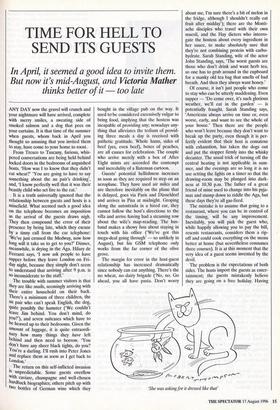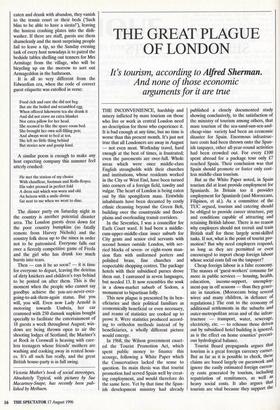TIME FOR HELL TO SEND ITS GUESTS
In April, it seemed a good idea to invite them. But now it's mid-August, and Victoria Mather thinks better of it — too late
ANY DAY now the gravel will crunch and your nightmare will have arrived, complete with merry smiles, a sweating side of smoked salmon and a dog that pees on your curtains. It is that time of the summer when guests, whom back in April you thought so amusing that you invited them to stay, have come to your home to roost.
From Tresco to Tuscany, furious, whis- pered conversations are being held behind locked doors in the bedrooms of anguished hosts. 'How was Ito know that they didn't eat wheat?' You are going to have to say something about the au pair's drinking', and, 'I know perfectly well that it'was their beastly child who set fire to the cat.'
It is a truth universally ignored that the relationship between guests and hosts is a minefield. What seemed such a good idea on the telephone becomes an imposition as the arrival of the guests draws nigh. They then compound the error of their Presence by being late, which they excuse by a tinny call from the car telephone: 'We've just crossed the Medway, now how long will it take us to get to you?' Dinner, meanwhile, is drying in the Aga. Hilary de Ferranti says, 'I now ask people to have supper before they leave London on Fri- day night, because they simply don't seem to understand that arriving after 9 p.m. is so inconsiderate to the staff.'
The trouble with summer visitors is that they are like snails, seemingly arriving with their entire household on their back. There's a minimum of three children, the au pair who can't speak English, the dog, quite possibly the hamster ('We couldn't leave Jim behind. You don't mind, do you?'), and seven suitcases which have to be heaved up to their bedrooms. Given the amount of luggage, it is quite extraordi- nary how many things they have left behind and then need to borrow. 'You don't have any sheer black tights, do you? You're a darling. I'll rush into Peter Jones and replace them as soon as I get back to London.'
The return on this self-inflicted invasion '5 unpredictable. Some guests overflow with caviare, champagne and well-chosen hardback biographies; others pitch up with two bottles of German wine which they
bought in the village pub on the way. It used to'be considered excessively vulgar to bring food, implying that the hostess was incapable of providing any; nowadays any- thing that alleviates the tedium of provid- ing three meals a day is received with pathetic gratitude. Whole hams, sides of beef (yes, even beef), boxes of peaches, are all causes for celebration. The couple who arrive merely with a box of After Eight mints are accorded the contempt and incredulity of a Bateman cartoon. Guests' potential hellishness increases as soon as they are required to step on an aeroplane. They have used air miles and are therefore inevitably on the plane that is delayed, goes via Paris and Diisseldorf and arrives in Pisa at midnight. Groping along the autostrada in a hired car, they cannot follow the host's directions to the villa and arrive having had a steaming row about the wife's map-reading. The hus- band makes a showy fuss about staying in touch with his office ('We've got this mega-deal going through' — so unlikely in August), but his GSM telephone only works from the far corner of the olive grove.
The margin for error in the host-guest relationship has increased dramatically since nobody can eat anything. There's the no wheat, no-dairy brigade ('No, no. Go ahead, you all have pasta. Don't worry about me, I'm sure there's a bit of melon in the fridge, although I shouldn't really eat fruit after midday'); there are the Monti- ache disciples who travel with their own muesli, and the Hay dieters who interro- gate the hostess about every ingredient in her sauce, to make absolutely sure that they're not combining protein with carbo- hydrate. Sarah Standing, wife of the actor John Standing, says, 'The worst guests are those who don't drink and want herb tea, so one has to grub around in the cupboard for a manky old tea bag that smells of bad breath. And then they always want honey.' Of course, it isn't just people who come to stay who can be utterly maddening. Even supper — `Do come over, it's such glorious weather, we'll eat in the garden' — is potentially fraught. Sarah Standing says, `Americans always arrive on time or, even worse, early, and want to see the whole of your house.' Then there are the people who won't leave because they don't want to break up the party, even though it is per- fectly evident that their host is comatose with exhaustion, has taken the dogs out and put the stopper firmly into the whisky decanter. The usual trick of turning off the central heating is not applicable in sum- mer, and the evenings are so long it is no use setting the lights on a timer so that the drawing-room may be plunged into dark- ness at 10.30 p.m. The father of a great friend of mine used to change into his pyja- mas and stump down to riddle the Aga, but these days they're all gas-fired.
The mistake is to assume that going to a restaurant, where you can be in control of the timing, will be any improvement. Inevitably, you will pick the guest who, while happily allowing you to pay the bill, resents restaurants, considers them a rip- off and could cook everything on the menu better at home (but nevertheless consumes three courses). It is at this moment that the very idea of a guest seems invented by the devil.
The problem is the expectations of both sides. The hosts import the guests as enter- tainment; the guests mistakenly believe they are going on a free holiday. Having `She was asking for it dressed like that' eaten and drunk with abandon, they vanish to the tennis court or their beds (Such bliss to be able to have a siesta!'), leaving the hostess crashing plates into the dish- washer. If there are staff, guests use them shamelessly and the most surprising people fail to leave a tip, so the Sunday evening task of every host nowadays is to patrol the bedside tables shelling out tenners for Mrs Armitage from the village, who will be bicycling up on the morrow to sort out Armageddon in the bathroom.
It is all so very different from the Edwardian era, when the code of correct guest etiquette was extolled in verse:
Food rich and rare she did not beg But ate the boiled and scrambled egg. When offered lukewarm tea she drank it And did not crave an extra blanket Nor extra pillow for her head.
She seemed to like the spare room bed. She brought her own self-filling pen; And always went to bed at ten.
She left no little thing behind But stories new and gossip kind.
A similar poem is enough to make any host expecting company this summer feel utterly crushed:
He met the station of my choice With chauffeur, footman and Rolls-Royce.
His valet pressed in perfect fold A dress suit which was worn and old.
An heiress with a smile divine Sat next to me when we went to dine.
The dinner party on Saturday night in the country is another potential disaster area. The London guests dress down for the poor country bumpkins (so fatally remote from Harvey Nichols) and the country folk dress up to the nines in order not to be patronised. Everyone falls out over a fiercely competitive game of Freda and the girl who has drunk too much bursts into tears.
Then — can it be so soon? — it is time for everyone to depart, leaving the detritus of dirty knickers and children's toys behind to be posted on after them. This is the moment when the people who cannot say goodbye achieve the you-are-never-ever- going-to-ask-them-again status. But you will, you will. Even now Lady Arnold is motoring towards Umbria, her car crammed with 250 damask napkins bought specially to facilitate the entertainment of 18 guests a week throughout August; win- dows are being thrown open to air the shooting lodges of Scotland; the Mariner's at Rock in Cornwall is heaving with care- less teenagers whose friends' mothers are washing and cooking away in rented hous- es. It's all such fun really, and the great British house-party is in full swing.
Victoria Mather's book of social stereotypes, Absolutely Typical, with pictures by Sue Macartney-Snape, has recently been pub- lished by Methuen.



















































 Previous page
Previous page